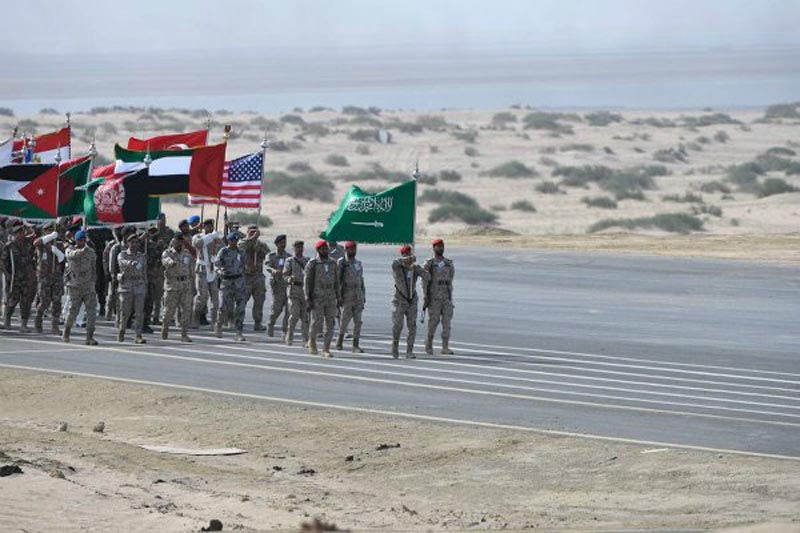
Arab nations should take the lead on MESA
Morgan D. Ortagus and Gabriel Noronha
One of the many wonderful lessons of the Abraham Accords is that Arab states are ready and able to lead the region, including taking more of the collective responsibility for providing peace, security and stability. For many decades, the US has worked hand in hand with Arab states, from development to now self-reliance.
Through our diplomatic and economic might, we helped weaken Bashar Assad’s war machine, pushed back on Iran’s regional aggression, and have continually tried to broker illusive peace between Israel and the Palestinians. We continue to spend billions of dollars supporting Egypt, Israel and Iraq, and training militaries to defend fragile governments. Obviously, not every policy action has been perfect or ended well, but there have been successes — the region is more stable, peaceful and prosperous today than it has been in decades.
As both political parties in the US turn our eyes toward great power competition with China, it is inevitable that we will not play the same role in the Middle East in the next two decades as we did the past two. We strongly support the US troop presence in Iraq and in bases around the Gulf, which continue to be vital to our shared strategic interests. But across the political spectrum in the US, there is a growing desire to shift our focus and resources to deal with the new era of geopolitical competition. As this happens, Arab nations must affirmatively come together to meet the current and future challenges emanating from the region. To be sure, there will continue to be many tough challenges ahead: Will Arab states stand by while the Iranian regime develops a nuclear weapon and arms proxies to overthrow Sunni states? Are they content with
Russia profiting from Libya’s ongoing violence? Are they ready to normalize Assad without consequences for his horrific crimes?
Many of these discussions are dominated by the US, Europe, Russia and China — and, unfortunately, talks often proceed without the neighbors most directly affected. The Arab world should have a seat at the table in more international negotiations, much as the EU often does, but it is often left out because it cannot speak with one voice. Its absence from the ongoing nuclear talks with Iran in Vienna is a particularly galling example. There are more than 400 million Arab citizens, with joint economies in the trillions of dollars.
The Arab world should have a seat at the table in more international negotiations, much as the EU often does.
If Arab states could come together on their own and if they were united in purpose through a more formal structure, these states would be a formidable force. They would not be left out of important conversations that directly affect the safety and security of their people. Together, they could more effectively build sustainable economies less dependent on the sale of oil, create a free-trade zone that would provide more jobs for young people, and push back against the radicalization of youth. These goals are dependent on strategic stability and domestic security, which are constantly undermined by the terror groups that receive much of their funding from nation states.
During the Trump administration, the US tried to develop such a structure through the Middle East Strategic Alliance (MESA), which was intended to develop military, diplomatic, economic and energy cooperation. This endeavor succeeded at producing joint meetings with Saudi Arabia, Bahrain, Jordan, Kuwait, Oman, Qatar and the UAE that pushed back on Iran by jointly condemning the September 2019 ballistic missile attack against Saudi Arabia. Further discussions resulted in a two-page agreement on the military side, which was finalized in the first months of 2020 by these countries, but the emergence of the coronavirus disease sidelined the final signing of the document.
Ultimately, the delay bled too close to the US election in November 2020 and participants wanted to wait until after the vote. Since President Joe Biden has been in office, there have unfortunately been no further public signs of progress.
However, just because Donald Trump is no longer in office does not mean the idea of MESA should disintegrate — it is just as valid a construct today as it was last year. Arab countries should take the lead to work with the Biden administration to formalize the initiative and build on the important groundwork that was developed in the last few years. To Arab leaders and diplomats: Stop waiting for the US — take control of your future now before the opportunity is lost. Make your voice heard if you do not think sending Iran tens of billions of dollars is a good idea.
Build on the Abraham Accords, solidify the bonds of friendship and economic cooperation between each other, and push for solutions to bring the region greater peace, prosperity and progress. As America focuses on great power competition with China, this is the only way for the Arab nations to get their own seat at the table.
Morgan D. Ortagus was the US State Department spokesperson under Secretary Michael R. Pompeo and is a senior adviser to the Scowcroft Center at the Atlantic Council.
The writer recently served as the special adviser for Iran at the State Department and is currently the executive director for two Washington based national security groups.
